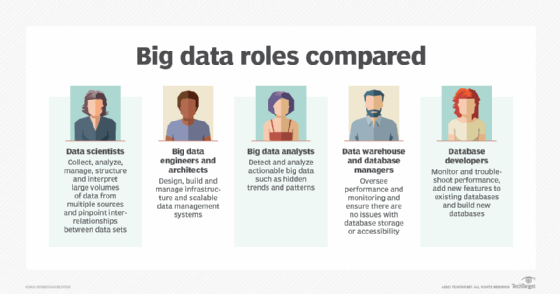
Fotolia
Top 7 big data courses for 2021
Building new big data skills can be beneficial for professionals of all types -- from aspiring data scientists to current big data workers and business executives.
Big data is a fast-growing field across all industries. Such tremendous growth has created a number of job opportunities for professionals to work with big data and a coinciding demand for the right technical skill sets.
In today's data-driven world, nearly every worker can benefit from acquiring relevant technical skills and knowledge about big data -- whether a young professional looking to switch to an entry-level data scientist role, a current big data worker trying to expand a skill set or a seasoned executive interested in learning more about data-informed decision-making.
What is big data?
Big data refers to the massive amounts of data collected by organizations. It is typically a combination of structured, semistructured and unstructured data.
This data can be mined for insights, such as patterns and trends in consumer behavior, or used for machine learning projects and advanced analytics. It can then be used for purposes such as refining marketing campaigns and predictive modeling.
Companies can use big data to gather business intelligence, improve operations, create personalized recommendations and marketing materials, provide better customer service and make better-informed business decisions. This increased use of big data has prompted the rise in demand for big data-related jobs.
What careers and jobs are there in big data?
Big data is used in many different industries besides technology. For example, medical researchers can use big data to identify trends and risk factors for the diagnosis of illnesses in patients, and electronic health records can provide statistics for government agencies and healthcare organizations. Retail organizations use big data to identify consumer trends and optimize marketing campaigns. Big data is also used to optimize supply chains, monitor oil and gas mining, track electrical grids for utilities and provide real-time market data reporting for financial services firms.

The use of big data technologies is complex and requires many different specialized skill sets. Therefore, jobs that work with big data are broken down into several titles. While titles and specific job duties can vary across organizations and industries, the following are some of the most common job titles in big data:
- Big data engineers are responsible for building and maintaining big data systems, such as a company's software and hardware resources, for retrieval and access. Big data engineers build data models and pipelines and manage extract, load, transform Big data engineers often are also tasked with data analysis.
- Data scientists collect, analyze and interpret large amounts of data using advanced analytics technologies. They use technologies such as machine learning, AI and predictive modeling to glean data for new and meaningful insights. Data scientist duties may overlap with those of big data engineers; for more info on how they compare and contrast, click here.
- Data architects design, build and maintain complex big data infrastructures and frameworks, such as a company's databases.
- Data warehouse managers oversee storage and analysis of large amounts of data in their organization's facilities. Data analysis duties are typically related to big data performance and monitoring.
- Database managers ensure that databases are running smoothly and that there are no issues with storage or accessibility.
- Data modelers are similar to data scientists but tend to focus more on reporting and visualization.
- Database developers monitor database performance, build new databases, add new features for existing databases and troubleshoot.
For all big data job titles, it is important to have a current understanding of general data management trends.
Here are the top seven online big data courses to build in-demand technical skill sets to work effectively with big data. Some of these courses are free and can be taken by anyone; others are a part of formal continuing education programs that require admission and paid tuition. While free courses are ideal for beginners looking to obtain introductory-level skills, paid formal programs offer hands-on experience working with faculty and may be more effective for career advancement or developing in-depth expertise in one specific area of big data.
These big data courses, which are often offered through online course providers Coursera and edX, are designed by accredited organizations in the field of computer science. These include the University of California, San Diego; Columbia University; Wharton School at the University of Pennsylvania; Harvard University; University of Adelaide; and vendors, including Cloudera and IBM. They offer general skills development for big data, as well as for popular fields within big data, such as data science, machine learning and business analytics.
1. Big Data Specialization
Offered by University of California, San Diego through Coursera
Start date: April 16, but this course is self-paced and can be joined after that date
Cost: Free
This course provides a basic overview of the uses for big data and technical instruction on how to use popular big data tools. It also provides students with hands-on experience analyzing and modeling big data sets. This course is open to all expertise levels, including beginners with no prior computer science or big data knowledge. This course will take approximately eight months to complete at a pace of three hours a week, and a certificate is provided upon completion.
Students will learn how to work with the following tools and technologies:
- big data
- MongoDB
- Apache Spark
- Apache Hadoop
- Neo4j
- MapReduce
- Cloudera
- data management tools
- Splunk
- machine learning
- big data integration
- big data processing
2. Applied Machine Learning
Offered by Columbia University, Executive Education
Start date: May 25
Cost: $2,350
This instructor-led, intermediate-level course teaches students specific techniques for supervised and unsupervised machine learning using the Python programming language and gives them experience implementing a machine learning project. While this course does not require any big data knowledge or programming experience, students must have completed undergraduate courses in statistics, calculus, linear algebra and probability. Prospective students also must pass a math skills assessment to enroll. The course's approximate time commitment is eight to 10 hours a week for five months.
Students will learn how to work with the following tools and technologies:
- Python
- machine learning
- regression models
- classification models
- unsupervised models
- data modeling
- probabilistic data models
- data manipulation and analysis
- statistical distributions and hypothesis testing
- data visualization
- sequential data models
- clustering methods
3. Introduction to Data Science Specialization
Offered by IBM through Coursera
Start date: April 16, but this set of courses is self-paced and can be joined after that date
Cost: Free
This specialization, which consists of four big data courses, serves as an introductory-level certification for individuals who are interested in taking the first step toward transitioning into a career in data science. The course is designed to help students understand data science's and machine learning's place in the world of technology, gain familiarity with common data science tools, understand data science methodologies and gain familiarity working with SQL and databases. No prerequisites are required to enroll. The expected time commitment is four hours a week for four months to receive a certificate of completion. Students will also receive a digital badge from IBM, recognizing them as a data science foundations specialist. This course can also be applied toward the IBM Data Science Professional Certificate.
Students will learn how to work with the following tools and technologies:
- data science concepts and methodologies
- relational database management systems
- cloud databases
- Python
- SQL
- JupyterLab
- GitHub
- IBM Watson Studio
- RStudio
4. Business Analytics: From Data to Insights
Offered by Wharton School of the University of Pennsylvania, Executive Education
Start date: May 13
Cost: $2,600
The nine modules of this course are designed to help professionals, managers and leaders better understand how big data works and how insights taken from big data can be used to make business decisions. The course is geared toward many different types of technical and nontechnical business people, including C-suite executives, mid- to senior-level managers, consultants, analysts, product managers and account managers. The course covers topics such as data collection methods, forecasting, data visualization, decision trees and regression analysis. The approximate time commitment is six to eight hours per week for three months. Prospective students must apply to be accepted into the course. Upon completion, a certificate is provided.
Students will learn how to work with the following tools and technologies:
- data collection
- predictive analytics
- descriptive analytics
- forecasting
- decision trees
- optimization models
- Analysis ToolPak
- optimization solvers
- A/B testing
- data interpretation
5. Big Data Fundamentals
Offered by University of Adelaide through edX
Start date: April 16, but this course is self-paced and can be joined after that date
Cost: Free; a verified certificate of completion is available for $199
This intermediate-level course is designed to help students gain a working knowledge of how organizations collect, use and analyze big data to make business decisions. Students learn to use MapReduce, understand the rate of occurrence for big data events and design different types of big data algorithms, as well as other big data techniques. Course enrollment does not require completion of formal prerequisites, but it is recommended that students have a background in basic data science concepts. The approximate time commitment for this course is eight to 10 hours per week for 10 weeks.
Students will learn how to work with the following tools and technologies:
- MapReduce
- stream processing algorithms
- PageRank algorithms
- random walk algorithms
- big data clustering
- data mining
- Google AdWords
- locality-sensitive hashing
6. Managing Big Data in Clusters and Cloud Storage
Offered by Cloudera through Coursera
Start date: April 16, but this course is self-paced and can be joined after that date
Cost: Free
This brief, focused course teaches big data beginners how to manage big data sets through clustering and cloud storage, as well as structuring data to run queries. This course will examine different types of data, big data storage systems, file formats and SQL engines, such as Apache Hive and Apache Impala. A certificate is available upon completion, and the expected time commitment for this course is 21 hours.
Students will learn how to work with the following tools and technologies:
- Apache Hive
- Apache Impala
- database management
- distributed big data file systems
- cloud storage systems
- cloud storage
- SQL
7. Data Science: Wrangling
Offered by Harvard University through edX
Start date: Enrollment open until June 30, 2021
Cost: Free; a verified certificate is available for $99
This introductory online course is designed as continuing education for professionals working in data science. The course teaches technical skills for data wrangling and data cleansing to prepare data sets for analysis from various data formats. A certificate is available upon completion. The approximate time commitment for this course is one to two hours per week for eight weeks.
Students will learn how to work with the following tools and technologies:
- the R programming language and importing data for different file formats into R
- data mining
- web scraping for data
- HTML parsing
- text mining
- tidyverse
- regex
- dplyr
- using dates and times as file formats
When considering big data courses, it is important to ensure the skills acquired will align with individual career goals. Big data is a broad term, as it can encompass business analytics, database management and data science courses.







